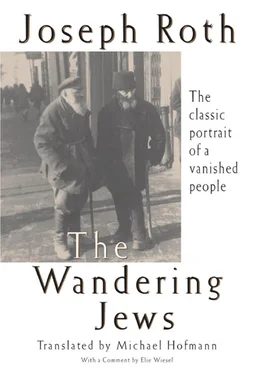Artistic fame also attaches to the singers — the precentors, or cantors as they are called in the West — known professionally as hazanim . These singers tend to fare better than the musicians, because their appointed task is a religious one and their art is sacred and liturgical. They are up alongside the priest. A few, whose reputation has spread as far as the United States, receive invitations to perform in the wealthy Jewish neighborhoods there. In Paris, which has several wealthy Eastern Jewish congregations, the representatives of the synagogues like to invite one of the celebrated singers and cantors from the East every year for the High Holy Days. Then the Jews attend prayers in the same spirit as one might attend a concert, and have their spiritual and artistic needs satisfied at once. It may be that the content of the many sung prayers and the spaces in which they are heard heighten the artistic reputation of the singer. I have never been able to verify whether those Jews were right who insisted to me that such and such a hazan was better than Caruso.
THE ODDEST PROFESSION is that of the batlan , the Eastern Jewish joker, a fool, a philosopher, a storyteller. Each shtetl has at least one batlan . He entertains the guests at weddings and bar mitzvahs. He sleeps in the prayerhouse, dreams up stories, listens to the men arguing, and racks his brain about all kinds of useless matters. No one takes him seriously. But he is the most serious person imaginable. He could have dealt in feathers or coral just as well as the prosperous merchant who invites him to a wedding in order to laugh at him. But he doesn’t trade. To work, to marry, to have children, to become a respected member of society — all these seem beyond him. Sometimes he treks from village to village, from town to town. He doesn’t starve, but he’s always on the brink of starvation. He doesn’t perish, he goes hungry, but he wants to go hungry. His stories would probably cause a stir in Europe if they were published. Many of them deal with subjects that are familiar from Yiddish and Russian literature. The famous Sha lom Aleichem was a typical batlan —only with greater ambition, sense of purpose, and awareness of his cultural mission.
A narrative gift is something frequently found in the East. In every family there is an uncle who is good at telling stories. They are like oral novelists, elaborating their stories beforehand, or else improvising them in the telling.
The winter nights are long and cold, and the storytellers, who often don’t have enough firewood, are happy to tell stories in return for a few glasses of hot tea and a place by the stove. They are treated differently — better— than the professional jokers, because they at least attempt to follow a practical profession, and are clever enough, in the presence of a typical, level-headed Jew, to conceal the beautiful madness that the fools blazon out. The fools are revolutionaries. The amateur storytellers have concluded compromises with the workaday world and have remained dilettantes. The average Jew thinks of philosophy and art as mere “entertainment”—unless they have a religious dimension. At least he’s honest enough to admit it, and doesn’t air his views on music or painting.
In recent years the Yiddish theater has become so widely known in the West that a description here would be superfluous. It’s become almost more of an institution of the Western ghetto than the East. The religious Jew does not attend it, in the belief that it offends against religious laws. The theater audiences in the East are enlightened Jews, who generally have nationalist sympathies by now. They are Europeans, though still a world away from the sort of Western European theatergoer who purposes nothing more than to “kill an evening.”
THE RUSTIC JEW of Eastern Europe is a type completely unknown in the West. No wonder: He has never gotten there. No less “a son of the soil” than the peasant, he is half peasant himself. He is a sharecropper or a miller or a village innkeeper. He has never learned a trade. Often he is completely illiterate. At most he is capable of doing little deals. He’s barely any cleverer than the peasant. He is big and strong and of an improbably sound constitution. He is physically brave, doesn’t mind a fistfight, and is afraid of nothing. Many take advantage of their superiority to the peasants, something that provoked local pogroms in old Russia and anti-Semitic campaigns in Galicia. But many are of a peasantlike meekness and greatheartedness. Many have the healthy common sense that one tends to find in the countryside, and that develops wherever a sensible race is immediately subject to the laws of nature.
IT IS DIFFICULT for me to talk about the Eastern Jewish proletariat. I am unable to exonerate a great part of this proletariat from the grave charge of being opposed to its own class; and if not opposed, then at least indifferent. None of the many untrue and unjust accusations that are brought against Eastern Jews by the West are as untrue and unjust as the accusation that they are what the gutter press likes to call Bolshevik. Of all the world’s poor, the poor Jew is surely the most conservative. He practically underwrites the perpetuation of the old social order. The great mass of the Jews are an overwhelmingly bourgeois class with separate national, religious, and racial traits. Anti-Semitism in the East (and in the West too, for that matter) is often more revolutionary, being, as the saying goes, “a socialism for idiots”—but a form of socialism nonetheless. The poor Slav, the peasant, the worker, the artisan — all of them live in the conviction that the Jew has money. He has as little money as his anti-Semitic enemies. But he lives respectably. He starves and stints himself in a more methodical way than the Christian proletarian does. You might say: He misses his meals at more regular hours. Only once a week — on Friday night — does he eat like his better-off coreligionists. He sends his children to school, where they wear better clothes; he is able to save a little money; and, being from an ancient line, he always has some possession or other: some piece of jewelry handed down to him, a bed, some furniture. He can always lay his hand on some valuable in his house. He is smart enough not to sell anything. He doesn’t drink, and he doesn’t have the sad, but healthy frivolity or indiscipline of the Christian workingman. He is always in a position to give his daughter a trousseau, and almost always a small dowry as well. He can even afford to keep a son-in-law. Whether the Jew is an artisan or a small trader, a poor scholar or temple-servant, a beggar or a water carrier — he refuses to be a proletarian. He insists on maintaining a distinction between himself and the country’s poor. He plays at being a little better off than he is. If he is a beggar, he would rather go cap in hand to the houses of the rich than stay in the street. And if he does beg in the street, then his main income is from a kind of principal supplier, whom he looks up with the utmost punctuality. He won’t beg from the richer farmer, but from the less-well-off Jew he will. He keeps a kind of middle-class self-respect. The Jews’ bourgeois propensity for charitable giving has its roots in the conservatism of Judaism, and it gets in the way of the radicalization of the Jewish proletariat. Religion and morals rule out all forms of violence, rule out agitation, incitement, and even the public display of envy. The poor devout Jew is reconciled to his destiny as much as the poor believer of any other religion. God makes one man rich, the other poor. Incitement against the rich would be tantamount to incitement against God.
The only consciously proletarian Jew is the Jewish worker. He tends to espouse socialism of various hues. The Eastern Jewish proletarian is thereby less of a Jew than his bourgeois or semiproletarian coreligionists are. Less of a Jew, even if he is a Jewish nationalist and Zionist. The most nationalistic Jewish socialist is the Poal Zionist, who aspires toward a socialist, or at least a workers’, state of Palestine. The boundaries between Jewish socialists and communists are less clear-cut than they are elsewhere, and there can be no talk of a German-style riven proletariat. Many Jewish workers belong to the Socialist or Communist Parties of their respective countries, which makes them Polish, Russian, or Romanian Socialists. Social issues almost invariably take precedence over national ones. It’s how workers of all countries see things. “National self-determination” is an intellectual luxury for a group that has nothing more serious to worry about. If there is one nation that is justified in seeing the “national question” as essential to its survival, then surely it is the Jews, who are forced to become a “nation” by the nationalism of the others. But the workers of this nation still sense the greater urgency of social issues. Their identification with the proletariat is stronger, more honest, and more consequent: They are “more radical,” which, in the vocabulary of the party-barons in Western Europe seems to have become a negative attribute. But it is merely a mistake on the part of the anti-Semites to suppose that Jews are radical revolutionaries. To middle- and lower-middle-class Jews, the idea of the Jewish revolutionary is an abomination.
Читать дальше












